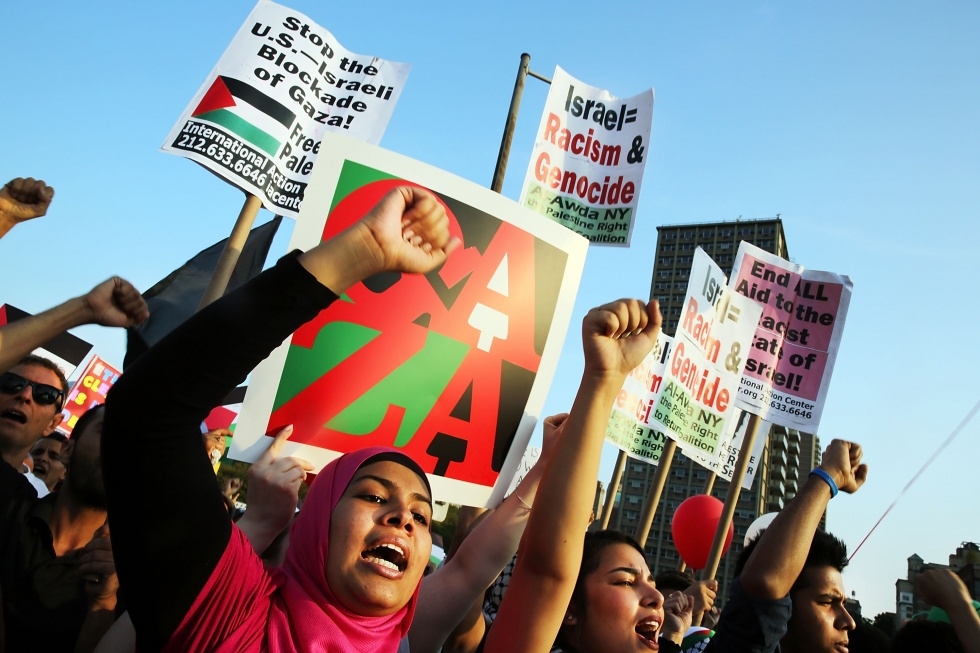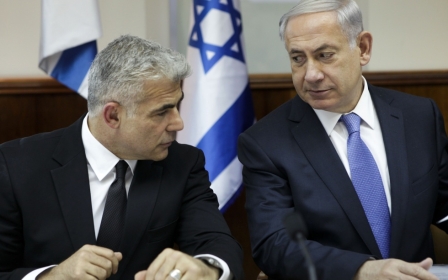Why US activists for Palestine are starting to play the Washington game

NEW YORK - The Democratic Party, some progressives in the US like to say, is the “graveyard of social movements”.
And for many years, activists for Palestinian rights have taken that sentiment to heart. Playing the Washington game has been seen as a waste of time. Activists who dismissed lobbying on Capitol Hill said it was a distraction from efforts like the boycott, divestment and sanctions (BDS) movement, a Palestinian-led initiative that advocates for boycotts of Israeli products, divestment from corporations with links to the Israeli army and government-level sanctions.
There's ample reason for this kind of thinking. Both Democrats and Republicans are united behind a right-wing, pro-Israel agenda that pours $3.1 bn of annual military aid into Israel. Last summer, as Israeli bombs blanketed the Gaza Strip, killing scores of civilians, politicians were busy voting for more aid to Israel.
But some advocates for Palestinian rights are beginning to shift their gaze from the streets to the halls of power. They say the time is ripe to begin building influence on Capitol Hill, once thought to be an immovable obstacle - thanks to the power of the American Israel Public Affairs Committee (AIPAC), the military-industrial complex and Christian Evangelicals.
Are these activists on to something? If the history of how US policy on South African apartheid was changed is any guide, the answer is yes. Divestment campaigns and a massive public opinion shift on South Africa helped pave the way towards US sanctions on the apartheid regime. Washington may be the place where social movements are co-opted, but it's also the place where powerful social movements can change US policy.
Activists in the US Palestine solidarity movement I've spoken to are fully aware that Capitol Hill is not going to change overnight. But some of them told me that they need to begin making their presence known in Washington, DC so that in the near future, they will be well positioned to impact US policy.
Driving this shift in strategy are polls showing that some Americans, particularly Democratic Party voters and young people, were wary of Israel’s actions last summer. In July, Gallup, a respected polling center, released data showing that the majority of Democrats - 47 percent - thought Israel's assault on Gaza was unjustified.
Rebecca Vilkomerson, the executive director of Jewish Voice for Peace - the only Jewish group to come out against the Gaza war - is looking to capitalise on these sentiments and drive a wedge in the iron-clad US-Israel relationship.
Israel is “right-wing in every single way, so actually its values don’t match the Democratic Party’s values,” she recently told me. “So I do think there’s a place to make that split apparent.” She is well aware of how progressive movements have been co-opted by the Democrats. At the same time, Vilkomerson said working on Capitol Hill is smart as long as the movement for justice in Palestine sticks to its principles, like calling for a halt to US military aid to Israel.
Vilkomerson's group recently announced they were hiring a federal policy organiser to ramp up their work in Washington, DC. Over the past year, local chapters of Jewish Voice for Peace have begun building relationships with members of the Congressional Progressive Caucus, a group composed of liberal Democrats.
It's not only Jewish Voice for Peace that is devoting energy to Capitol Hill. Groups like the US Campaign to End the Occupation and the Arab American Institute have begun to insert themselves into the debate in the US capitol.
The latter groups won a victory when they successfully lobbied for changes in a bill called the US-Israel Strategic Partnership Act, which would expand the already robust cooperation between the US and Israel. While it was introduced in 2013, it took almost two years for the legislation to pass the Senate. (The House passed a version in March.) It was held up in part because of concerns over legislative language granting Israel entry into the visa-waiver program with the US, which would have allowed Israeli tourists to enter the US without a visa. Pro-Palestine activists lobbied for changes in the legislation since it gave Israel a security exemption that would allow the state to deny entry to Americans it deemed a threat.
Normally, countries that have similar agreements with the US allow Americans to travel without visas to their country with no strings attached. Israel would have been the only country with such a security exemption. It would have allowed Israel entry into the program without reciprocal visa-free travel privileges for all Americans - particularly Arabs and Palestinians, who complain of discriminatory treatment at Israeli-controlled border crossings.
After an outcry from activists, the exemption for Israel was taken out. The lobbying effort among activists could serve as a model for future battles. Still, the legislation as a whole cements the US-Israel alliance. Its passage exemplifies how huge obstacles to change remain - something advocates for changing US policy on Israel are quick to admit.
Mike Coogan, the legislative coordinator for the US Campaign to End the Occupation, says that one challenge to working with legislators is the perception that AIPAC and groups like them would go after elected officials - and, crucially, not fund their campaigns - if they don’t espouse pro-Israel sentiments. Another obstacle to change is convincing activists themselves that it’s worth it to talk to legislators.
“It’s easy to write them off and move on to other things,” Coogan told me. “But I think that’s done real damage in the sense that we don’t have those relationships, we don’t have those connections.”
Yousef Munayyer, the executive director of the Washington-based Palestine Center, agrees that working on Capitol Hill is important and needs to be done. But he said that, for pro-Palestinian groups, “there’s only a given amount of resources, and it takes a lot to be effective and competitive in an environment like Capitol Hill, where there’s such fierce opposition to these kinds of ideas”. He said that a group like Jewish Voice for Peace may have more success, though, because they’re a Jewish group, which could shield legislators worried about being criticised for raising questions about Israel.
It's likely that Congress will be the last obstacle standing in the way of a change in US policy towards Israel. But if advocates for Palestinian rights find success in Washington, DC, the jig for Israel is up. It will find itself isolated and shunned. And for the Palestinians chafing under Israel's boot, that can only be a good thing.
Alex Kane is a New York-based freelance journalist whose work focuses on the American Jewish community, Israel/Palestine and the US “war on terror.” A former editor at Mondoweiss and AlterNet, his work has also appeared in the Los Angeles Review of Books, Salon, VICE, and more. Follow him on Twitter @alexbkane.
The views expressed in this article belong to the author and do not necessarily reflect the editorial policy of Middle East Eye.
New MEE newsletter: Jerusalem Dispatch
Sign up to get the latest insights and analysis on Israel-Palestine, alongside Turkey Unpacked and other MEE newsletters
Middle East Eye delivers independent and unrivalled coverage and analysis of the Middle East, North Africa and beyond. To learn more about republishing this content and the associated fees, please fill out this form. More about MEE can be found here.





